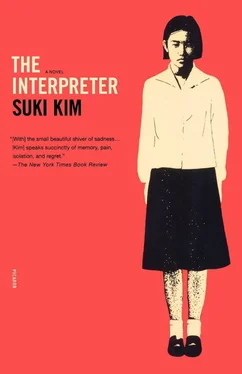Suki Kim - The Interpreter
Здесь есть возможность читать онлайн «Suki Kim - The Interpreter» весь текст электронной книги совершенно бесплатно (целиком полную версию без сокращений). В некоторых случаях можно слушать аудио, скачать через торрент в формате fb2 и присутствует краткое содержание. Город: New York, Год выпуска: 2011, ISBN: 2011, Издательство: Picador, Жанр: Детектив, Триллер, на английском языке. Описание произведения, (предисловие) а так же отзывы посетителей доступны на портале библиотеки ЛибКат.
- Название:The Interpreter
- Автор:
- Издательство:Picador
- Жанр:
- Год:2011
- Город:New York
- ISBN:0-312-42224-5
- Рейтинг книги:3 / 5. Голосов: 1
-
Избранное:Добавить в избранное
- Отзывы:
-
Ваша оценка:
- 60
- 1
- 2
- 3
- 4
- 5
The Interpreter: краткое содержание, описание и аннотация
Предлагаем к чтению аннотацию, описание, краткое содержание или предисловие (зависит от того, что написал сам автор книги «The Interpreter»). Если вы не нашли необходимую информацию о книге — напишите в комментариях, мы постараемся отыскать её.
The Interpreter — читать онлайн бесплатно полную книгу (весь текст) целиком
Ниже представлен текст книги, разбитый по страницам. Система сохранения места последней прочитанной страницы, позволяет с удобством читать онлайн бесплатно книгу «The Interpreter», без необходимости каждый раз заново искать на чём Вы остановились. Поставьте закладку, и сможете в любой момент перейти на страницу, на которой закончили чтение.
Интервал:
Закладка:
The phone starts ringing again. Whoever it is does not want to leave the evidence. Whoever it is is desperately looking for her. The Caller ID says “private.” But she knew that without even looking at it. Suzy finally takes off her coat, throwing it on a silk hanger from the pricey Madison Avenue shop. Took Sandy all afternoon to find it, Michael claimed. Michael wants Suzy in the latest fashion. He wants the latest of anything. Often she stands in front a mirror, clad in what strikes her as carefully sewn and stitched money, lots of it. She hardly recognizes herself. A bona fide mistress, whose clothing shields her from herself. Suzy brushes her fingers across the array of silk shirts and cashmere sweaters. They come in every shade of black. “To match your hair, Suzy,” Michael said. She imagines his wife in the most flamboyant pitch of red and green, a blonde surely, once-upon-a-sorority, maybe a book club or two, that would suit him. Michael never discusses his family. It is taboo, and Suzy prefers it that way. She knows how to be a kept woman. She got her start early. She even sacrificed her own parents to be one, so she had better be damn good at it. The phone starts again, and Suzy stares at it without turning off the ringer. Then she walks to the end of the railroad and turns the hot water on to the fullest.
4.
THE VOICE ON THE OTHER END shouts, “Delivery.” Suzy presses the intercom button, standing at the door in her bathrobe with her hair wrapped in a towel. The deliveryman smiles, as if her wetness suggests a private promise. In his arms is a bouquet of white irises. “Sign the receipt, please,” he says, and she asks, “From whom?” although she already knows the answer. No sender’s name, nothing. No note, no miniature card with a happy smile, no heart-shaped balloon with a double I-love-you’s. A bunch of white irises, a rarity in November, but only in November, always in November. Almost exactly four years ago, a man first appeared at her doorstep with a bunch of white irises much like these. It occurred to her that they might be from Damian, but this was not Damian’s style, and delicate white irises definitely not his thing. Then who? Not Michael, because she did not even know him then, and not a secret admirer, Caleb said he hoped, because the joke was too old and she was not so young anymore. They were always delivered right around the anniversary of her parents’ death. She wonders if they were sent to Grace also. But why irises, why such insistence? Mom had liked them, Suzy vaguely recalls. Her parents used to sell them at their store. Mom said that, among all garden flowers, irises needed the most care, because they withered quickly and had virtually no smell. Her mother was not one of those softies whose hearts melt at the sight of long-stemmed roses or tulips, and neither was Suzy. They were pleasing to look at, she thought, but why not leave them wherever they came from, either the perennial fields of the Netherlands or the sloping valleys of northern California, anywhere at all but primped like a poodle and squeezed into a glass vase on a now-satisfied girlfriend’s mantel in order to reassure her that somebody loved her on this Valentine’s Day or birthday or anniversary? A bouquet reminded Suzy of a Hallmark card from a corner stationery store, whose price was preprinted and whose purpose was long prescribed. Only once she thought that flowers served a purpose, and that was at the funeral. Grace must have arranged it, which surprised Suzy, but one could never tell how a sibling might react to one’s parents’ death, which sort of coffin, open casket or not, a chorus of hymns even if they had never believed in Christ. There were white flowers everywhere around both coffins, either lilies or chrysanthemums, although Suzy cannot recall if she saw irises among them. Dad would have thrown a fit, she thought then. “Frivolous!” he would’ve screamed. “What a waste! In Korea, no one would dare to throw away so much for nothing!” And that must be exactly why Grace chose to do it. Everyone thought that the flowers were appropriate. But Suzy knew that they were the last things her parents would have wanted at their final moment.
Grabbing the nearly empty Evian bottle from the refrigerator, Suzy cuts open the top part and sticks the flowers in it. She is not sure where to put it, although she must have found a spot for it each year. On the dining table, there, she places the bottle on the corner as if putting it away. Irises are sad flowers, she thinks, neither as glamorous as roses nor as graceful as lilies, just a run-of-the-mill sort. Each flower stalk stands perfectly straight, with slivers of drooping falls. White ones are the worst. Such petals, signaling perpetual mourning. Mom was right. It is eerie how they carry no scent, no trace.
Suzy told no one about the flowers. Somehow she thought that she was not supposed to, that it was meant to be a secret between her and whoever sent them, and that if she were to break this code something bad was bound to happen. Caleb was the only one who knew, because the first delivery came while he was over. “An acquaintance of your parents, probably,” he said. “Maybe he owed them money, maybe he cheated your parents a little and feels sorry, who knows, but whoever it is sure isn’t very original!”
November is a strange month anyway, not quite the winter, not quite the end of a year, and Suzy not quite thirty. She is happy to be almost done with her twenties. The whole youth thing escaped her. While other girls fretted about noncommittal boyfriends, maniacal bosses, or aimless Friday nights, Suzy was always looking to see who might be lashing at her from behind. It is impossible to insist on youth when your own parents call you a whore. But one cannot blame the dead. Whatever meanness is forgotten, washed away, gone with the ashes. It is their privilege. And here’s Suzy, five years since the funeral, still looking over her shoulder, or looking at the screeching phone, which will not leave her alone.
Perhaps it is the last echo of Dad’s anger, the way he muttered “ yang-gal-bo ” under his breath, or perhaps the faraway look on Mom, who would not meet Suzy’s eyes, but Suzy continues to stare at the phone without turning off the ringer. Each ring is a slash, a slap, a shot or two.
Two shots only; the gun had fired exactly twice and pierced their hearts.
Too precise for a random shooting, too perfectly executed, too clean. There wasn’t much bleeding, she was told. The bullets stopped their hearts.
A cold murder, a professional’s job, miss, your parents died instantly.
Suzy knows nothing further, and Grace will not speak to her. The Bronx Homicide Unit did the usual investigation, but there was no witness, no evidence, no suspect. There had been several similar shootings around the neighborhood, all unsolved. The case was quite typical, Detective Lester told Suzy: a useless killing by useless thugs. The victims were almost always immigrants, but there were no outstanding conflicts between specific immigrant groups, just the usual squabble. “Don’t worry,” he said. “We’ll get them; these thugs end up in jail anyway, if not for this, then something equally horrendous sooner or later.” And that was that. Grace took care of the store, the funeral, and their Queens brownstone. She contacted Suzy only once, through the accountant, about a small sum of money Suzy was entitled to from the sale of her parents’ possessions, but Suzy quietly declined. What right did she have? When Dad called her a whore, she stood up and said, I wish I wasn’t your daughter! That was her farewell to him.
Nine years now, almost ten. She had just turned twenty when she ran off with Damian. Four years later, her parents were shot at their store. Five years have passed since their death. Once you start counting years, the numbers drive you crazy. A decade since she’s seen her parents alive, which should make her a credible orphan, and yet one never gets used to being alone. A bouquet of flowers arrives, and she cannot imagine who could’ve sent it, who would know that irises were her mother’s favorite flowers, who would mark each November to commemorate her parents’ death, who would care whom she loves, who would cry because she will never marry him because he is already married, who would call her a whore, hoping it would stop her from plunging onto the wrong track, who would lose sleep at night because she is all alone in her railroad apartment afraid to answer the phone.
Читать дальшеИнтервал:
Закладка:
Похожие книги на «The Interpreter»
Представляем Вашему вниманию похожие книги на «The Interpreter» списком для выбора. Мы отобрали схожую по названию и смыслу литературу в надежде предоставить читателям больше вариантов отыскать новые, интересные, ещё непрочитанные произведения.
Обсуждение, отзывы о книге «The Interpreter» и просто собственные мнения читателей. Оставьте ваши комментарии, напишите, что Вы думаете о произведении, его смысле или главных героях. Укажите что конкретно понравилось, а что нет, и почему Вы так считаете.












